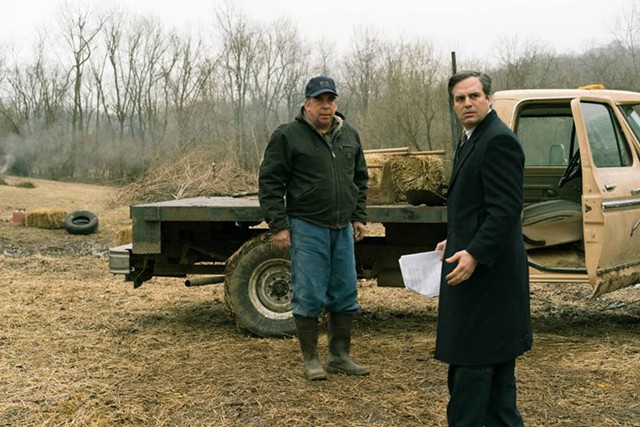
- DRINKING PROBLEM Ruffalo plays a real-life lawyer who battled DuPont on behalf of the town whose water the company poisoned.
Just when you're positive you couldn't possibly be even a fraction more bummed about the state of the nation, along comes the latest from Todd Haynes (Carol) to make you feel way, way worse.
That's not the director's goal, obviously. There's a determined and honorable real-life attorney in the middle of all Dark Waters' depressing real-life corporate malfeasance, and the audience is meant to celebrate him. Here's the thing: Two hours and change after meeting our hero, my guess is you'll be more depressed than you were before. Despite striking similarities, Erin Brockovich this is not.
Mark Ruffalo plays Rob Bilott, a Cincinnati lawyer at a firm that specializes in defending big chemical companies (are there tiny ones?). When a West Virginia farmer he knows through his grandmother bursts into his office demanding he take legal action against DuPont, Bilott figures the guy's off his nut. Then he makes a trip to the fellow's spread and gets a life-altering eyeful. On one side of the property is the burial site for thousands of barrels filled with DuPont's toxic waste. On the other, the farmer has buried virtually his entire herd — nearly 200 cows. Neither man is a scientist, but both connect the toxic dots.
At first, Bilott's coworkers and even the brass at DuPont are good-humored about his taking the case. Parkersburg is a company town, and nobody really believes he'd dream of biting the hand that feeds practically everyone in it. Tim Robbins costars as the gruffly supportive head of the practice. Victor Garber does a slow boil as Phil Donnelly, a top executive with the corporate giant.
In early scenes, we watch Bilott socialize with the big shots on both sides. As the case heats up, however, the attorney finds himself increasingly ostracized. When he goes after in-house DuPont records, Donnelly jumps at the chance to bury Bilott in paper: hundreds of boxes overflowing with company documents. He assumes that one man will never wade through them all. It takes years, but Bilott does.
What he finds isn't a smoking gun but a smoking arms depot. The records reveal that DuPont knew from the start that the forever chemicals used to produce its nonstick breakthrough Teflon posed a serious health hazard to both employees and the public. Women on the production line got sick, had babies with birth defects or both. Meanwhile, the locals developed a statistically astonishing variety of diseases. The toxic waste that DuPont didn't bury in metal drums, Bilott discovered, it dumped into the water supply or incinerated into the atmosphere.
All this and the class action settlement ($671 million) that Bilott won in 2017 are a matter of public record. What comes as an unpleasant surprise — and, honestly, a total buzzkill — is that DuPont not only never admitted wrongdoing but has never stopped selling Teflon-coated products. Despite all the evidence Bilott uncovered and the headlines it made, the company still makes billions on those products every year, and the EPA refuses to regulate.
So, yeah, the movie tells an urgent, important story. Unfortunately, the writing, direction and acting are a trifle wooden and a little too on the nose. There's an afterschool-special quality to the film in places. And, most unfortunately of all, Dark Waters arrives at a time when moviegoers aren't exactly seeking out further reason to believe the system's broken. As a result, most probably won't seek out Dark Waters, either.









Comments
Showing 1-1 of 1
Comments are closed.
From 2014-2020, Seven Days allowed readers to comment on all stories posted on our website. While we've appreciated the suggestions and insights, right now Seven Days is prioritizing our core mission — producing high-quality, responsible local journalism — over moderating online debates between readers.
To criticize, correct or praise our reporting, please send us a letter to the editor or send us a tip. We’ll check it out and report the results.
Online comments may return when we have better tech tools for managing them. Thanks for reading.